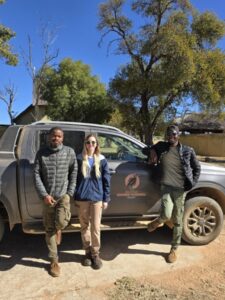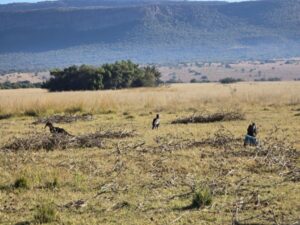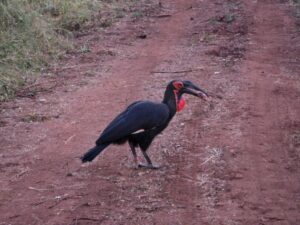My journey to South Africa and Mabula Ground-Hornbill Project
Welcome back for another look into the conservation work that Zoo Atlanta supports around the world. My name is Emmy Gibson, and I work as the Youth and Family Programs Supervisor in the Education Department at Zoo Atlanta. If you’ve ever spent the night at the Zoo with your family, school, or Scout group, you may have met me! My favorite thing about working at Zoo Atlanta is getting the opportunity to teach young people how special animals are and how they can help protect animals so they can survive and thrive in the future.
 Last month, I was able to travel to the Limpopo region of South Africa as a recipient of Zoo Atlanta’s Mickelberg Field Conservation Grant to connect with Mabula Ground-Hornbill Project on the important work they do to directly help hornbills in the field and build a future for hornbills through education.
Last month, I was able to travel to the Limpopo region of South Africa as a recipient of Zoo Atlanta’s Mickelberg Field Conservation Grant to connect with Mabula Ground-Hornbill Project on the important work they do to directly help hornbills in the field and build a future for hornbills through education.
As you may recall from our last blog post, southern ground hornbills are listed as Vulnerable on the IUCN Red List. In South Africa in particular, these animals have experienced a significant decline and are considered locally endangered due to their dwindling numbers across their historic ranges. They face threats in their environment mainly due to the expansion of human society and infrastructure.
Roads and windows on our houses are essential to the way we live, but they pose challenges to the safety of birds like ground hornbills. As the name suggests, ground hornbills spend 70% of their time on the ground, and so they may walk across roads and be susceptible to oncoming traffic. The windows on homes pose an interesting risk. While birdstrike is a common cause of death for songbirds worldwide, for ground hornbills, their struggle with windows stems from their territorial nature. When they see themselves in a window, they perceive their reflection to be a rival hornbill. To ward off the intruder, they peck at the glass until it breaks. Angry homeowners may seek revenge against birds who break their windows. These are just some of the ways that conflict occurs between ground hornbills and people living in South Africa.
Given these challenges, one of the key missions of Mabula Ground-Hornbill Project is to educate local and visiting youth, adults, and families about why ground hornbills are important to protect and empower them to make choices in their daily lives that impact ground hornbills for the better. As an educator by passion and profession, I knew I would best be able to contribute to the conservation of my favorite animals by participating in this part of the mission.
 Before I could write educational content about the conservation work of Mabula Ground Hornbill Project, I had to experience it for myself. For the first three days of my visit, I worked alongside the team to deconstruct, relocate, and reconstruct a boma on the Qwabi Private Game Reserve. Bomas are temporary enclosures for introducing animals to new areas. They allow the animal a safe space to familiarize themselves with the sights, sounds, and smells of what is going to be the animal’s new home range, without the worry of predation or other disturbance. In the case of southern ground hornbills, these bomas need to be located far apart because these animals are territorial and can occupy a home range of 100 square kilometers (almost 40 square miles) or more. We wouldn’t want to upset the established hornbill group by introducing new hornbills in their territory, and so we set off on constructing the boma in a different part of the reserve.
Before I could write educational content about the conservation work of Mabula Ground Hornbill Project, I had to experience it for myself. For the first three days of my visit, I worked alongside the team to deconstruct, relocate, and reconstruct a boma on the Qwabi Private Game Reserve. Bomas are temporary enclosures for introducing animals to new areas. They allow the animal a safe space to familiarize themselves with the sights, sounds, and smells of what is going to be the animal’s new home range, without the worry of predation or other disturbance. In the case of southern ground hornbills, these bomas need to be located far apart because these animals are territorial and can occupy a home range of 100 square kilometers (almost 40 square miles) or more. We wouldn’t want to upset the established hornbill group by introducing new hornbills in their territory, and so we set off on constructing the boma in a different part of the reserve.
Next came the opportunity to monitor previously released hornbills alongside the team. We used VHF (Very High Frequency) Radio Telemetry equipment and word of mouth from community members to triangulate the location of the hornbills. Once we had visual on an individual, it was time to give them their yearly Newcastle vaccination to ensure their protection against this highly contagious virus in birds. We used a syringe to inject the vaccine into a food item, in this case, a chicken head, and then we tossed the food into the bush between us and the hornbill. Luckily, hornbills have excellent vision and a strong drive to hunt for food, so they were able to locate and gobble down their vaccine-treated meal quickly!
Once I had a better understanding of the field work that Mabula Ground Hornbill Project does, it was time to return to their office to discuss education as a cornerstone for the future of the species. To ensure the success of the newly reintroduced southern ground hornbills, efforts need to be made for both locals and visitors to the region to understand the impact they have on the environment.
 One resource Mabula Ground Hornbill Project is consistently developing and refining to serve this purpose is an educational booklet. This is provided as a free resource for South African teachers to connect their students of all ages to the natural world and the southern ground hornbills that may live in their area. I was thankful to have the opportunity to contribute to this resource and leave a lasting impact on all the children I wasn’t able to directly teach in my two short weeks in the country.
One resource Mabula Ground Hornbill Project is consistently developing and refining to serve this purpose is an educational booklet. This is provided as a free resource for South African teachers to connect their students of all ages to the natural world and the southern ground hornbills that may live in their area. I was thankful to have the opportunity to contribute to this resource and leave a lasting impact on all the children I wasn’t able to directly teach in my two short weeks in the country.
Another resource that Mabula Ground Hornbill Project provides is interactive programming for South African and international visitors on vacation at local game reserves. For the youngest visitors, we created lessons featuring the cultural story of the Thunderbird, another name for southern ground hornbills, to spark the children’s curiosity and respect for them. For teenage audiences, we developed activities that encourage teens to step into the “shoes” of a southern ground hornbill and those of a conservationist – experiencing the threats that affect the species through role-play games and trying their hands at tasks like monitoring individuals and building nest boxes. With adult visitors, we facilitated discussions and tours of the area to look for the hornbills and their nest boxes to familiarize them with the species and local conservation efforts.
The most important takeaway from my time with Mabula Ground Hornbill Project is that the things we humans take for granted as part of our daily lives can have a profound impact on wildlife, whether we are at home in the United States or across the Atlantic in South Africa. On the bright side, this also provides us with hope and opportunity. It means that by making small changes, we can have a profoundly positive impact on animals. Even if travel plans aren’t in your future, you can make a difference here at home. Consider putting up window clings to prevent birds in your area from getting confused and injured. Consider participating in local citizen science efforts like the Great Backyard Bird Count to help monitor the health of local bird populations. Teach others what you know about wildlife to spread appreciation, wonder, and respect for the natural world. And never stop learning!
Emmy Gibson
Youth and Family Programs Supervisor

Connect With Your Wild Side #onlyzooatl